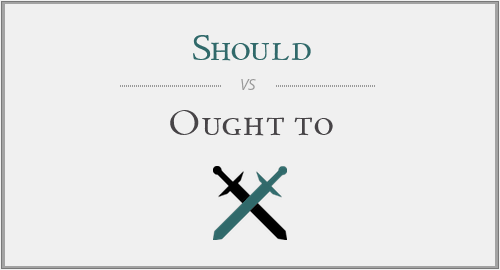Should – generally should is used to indicate an advice or the best suggestion for a situation.
· I should go and pick up my kids from school now.
· You should not smoke, it is not good for your health.
· We should avoid going out at this time.
· Shouldn’t you be at work now?
Should is also used to indicate a possibility or probability for future situations –
· Don’t worry about the interview, you should be good.
· The previous seasons of this TV show were good, so this one should be good too.
Should have – should have indicates past situations that were possible earlier, but not in present or future. For example, “You should have known better.” or “I should have taken the medicine on time.” Or “We should have spoken to her yesterday itself.”
Ought to – should is used to give advice or opinion and one can choose to follow or ignore it, whereas ought to is used when the advice has to be followed. While should and ought to are used interchangeably, ought to is a stronger word compared to should and is more appropriate to use while talking about rules, regulations and laws. Examples –
· You ought to follow the traffic rules.
· They ought to sign the register before entering the apartment.
· You ought to be at work on time.

Must – must is the strongest of all three words and indicates the ‘need of the hour’ or absolutely necessary situation. For example –
· You must leave the premises right now!
· You must attend the interview to get this job.
· You must follow the instructions carefully to open the box.
· We must take responsibility for our belongings.
Let us take one sentence and put each of these words and see the difference it makes to the overall meaning of the sentence chosen –
Sentence – you _____ study hard to pass the exam.
1. should – you should study hard to clear the exam. – well that’s what I think, if you study well, you will get good marks and clear the exam, but it is up to you to do that.
2. ought to – you ought to study hard to clear the exam – that’s the key to clear the exam – study well and hard. So, if you study hard, you can be sure to clear it.
3. must – you must study hard to clear the exam. – it is most important and necessary to clear the exam and hence there is no choice but to study hard for it.
Hope the example gives a fair understanding of how to use these 3 auxiliaries in different everyday situations we encounter.




Have a discussion about this article with the community:
Report Comment
We're doing our best to make sure our content is useful, accurate and safe.
If by any chance you spot an inappropriate comment while navigating through our website please use this form to let us know, and we'll take care of it shortly.
Attachment
You need to be logged in to favorite.
Log In